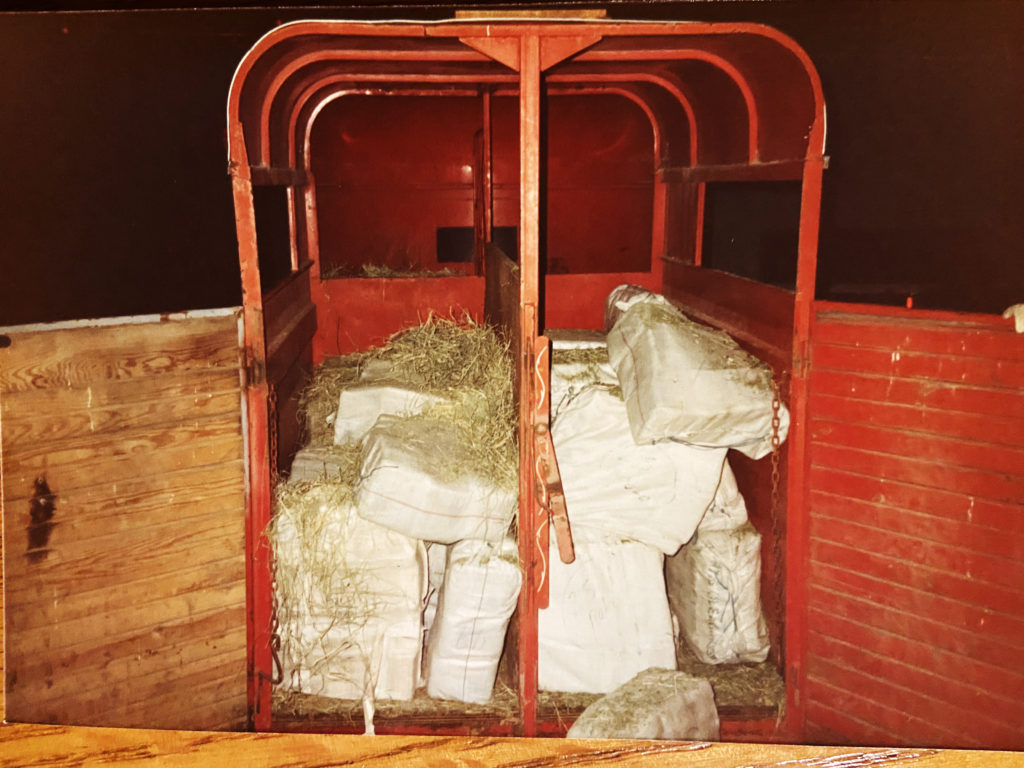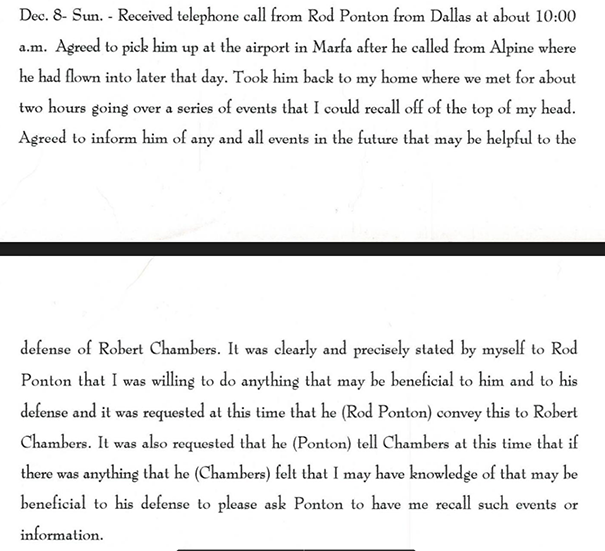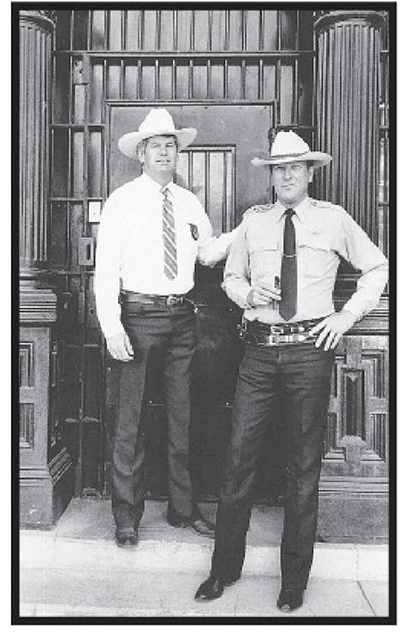Episode 6: Oh Shit

Please excuse any typos or other errors. Actually don’t excuse them…just give me a heads up about them. Feel free to comment on anything or ask questions below.
January 11, 2022
The guts of the bust
In this episode, we get to the guts of the night of the bust and the following days. It’s a good summation of the events, but of course, there’s always more detail. One item we didn’t add was that in addition to informant Sam Thomas’ account of the sheriff’s involvement, the feds also had records of a series of phone calls from Chambers to the sheriff on the nights of the smuggling.
Another item not explored in the show was varying accounts of why the sheriff became the mule to bring the coke to Marfa and why he made three trips. What’s clear from many sources is that something likely happened to Chambers’ truck on the way from the river to his family ranch near Candelaria. Some said stuck in the mud. Others said it broke down.
And when I say “near Candelaria,” you have to keep that in perspective. This is the Texas Borderlands. That ranch is some 13-14 miles from the town and the river crossing, all over rugged roads. Dale Stinson and Kelly Cook think he may have broke an axel. It’s likely that debriefing notes from Sam Thomas would have had a lot of details, but alas they were unobtainable (for a variety of long-winded reasons). Regardless, it’s clear that Chambers called the sheriff for help.
That leads to another question that always bothered me. How did Chambers, likely stuck in the middle of no where, call the Sheriff? There were no cell phones. It’s possible that he hiked to his family ranch, or perhaps he was with another vehicle that got there. One source told me that Chambers actually radioed his common-law wife in Alpine, who then called the sheriff. That’s a long freakin’ way for radio transmission. But another source told me that he knew a guy that equipped the sheriff’s car and Chambers’ truck with premium radio fitted to communicate with each other–and that Chambers had spent a fortune mounting radio repeaters in the hills to enable long-distance communication.
Kelly Cook states it plainly in the podcast that the sheriff was the perfect mule, because he could go anywhere in the county without anyone questioning him. Still, it makes me wonder if this was the only time Thompson had such a “hands-on” experience with smuggling. A couple of South Presidio County locals had stories of the sheriff seen with a trailer loading marijuana. Another story from Travis Kuykendall of the DEA relates an incident where the sheriff went and picked up a drop-off of weed for Chambers somewhere at an overpass in the middle of nowhere. Kelly and Dale were unaware of these stories, and I never found solid evidence to substantiate them.
Something Kelly and Dale did know was that Robert used to have a different MO for getting drugs across the river. This was best outlined to me by Travis Kuykendall–how an expert pilot name Guadalupe would take off from Mexico and fly in low across the river, then land on a long stretch of lonely highway just outside of Valentine, which is 36 miles west of Marfa. A truck’s headlights would serve as landing lights, and a group of men would be waiting on this Ranch Road 505 landing strip to offload the drugs. It’s possible the sheriff could have made sure there were no deputies in the area when the flights were scheduled–but that’s just a guess.
Travis told me Chambers and crew stopped the flights because Guadalupe’s eyesight was failing. Whatever the reason, by 1991, Chambers was now using the river crossing near Candelaria. The DEA believes that drug lord Amado Carillo Fuentes had six more tons of coke waiting somewhere in Mexico to follow the first ton. It’s unclear where that coke was stored.
For those curious about the red horse trailer: The Sheriff’s Department eventually sold it an auction to a woman who moved it to Montana.
Regarding Katherine Palmira and Donald Judd
I told you a bit about Katherine Palmira in the Episode 4 Notes. You hear in the podcast that she worked for famed minimalist artist Donald Judd. What you don’t hear is that Katherine was serving as a sort of reporter for Judd, sending him memos on the latest developments in the sheriff’s case. It’s rather odd that Judd–who apparently was not in town—took such an interest in the case beyond reading what was reported in the Big Bend Sentinel. Those I spoke to said the two obviously knew each other but were not close in any meaningful way. You’ll hear more about Judd in Episode 7.
(I should note a correction here. Katherine worked for the sheriff for a year and nearly nine months–not just nine months. That was my fault, for guiding the fact checker in the wrong direction on a rather confusing recording.)
So, Katherine did know the sheriff very well. And she knew Robert really well. And it’s clear she had sincere affection for them (and still does for Robert), although with a dose of something akin to viewing them as tragic figures. That puts her in a rather unique place in this story, since most of the sources either knew the sheriff well, or Chambers, but not both.

We didn’t report this in the podcast, but Katherine was quite adamant at the time in trying to help Chambers’s defense. She contacted his attorney, Rod Ponton, several times offering any info about the sheriff that might be helpful.
On Texas Ranger Joaquin Jackson

Joaquin Jackson was super tight with the sheriff. He included some of his thoughts about how he felt betrayed by Thompson after the busts. Jackson died in 2016 before I started my project, but I talked to his co-writer for his memoir, David Marion Wilkinson, who said the Thompson bust had a profound impact on the ranger. “THIS CASE DID NOT sit well with me,” Jackson wrote in One Ranger. “I felt used. I felt humiliated. I felt dumb.”
Some have questioned how Jackson couldn’t have known about Thompson’s smuggling. He makes a pretty convincing case on why he didn’t put the pieces together in this chapter from One Ranger, which aside from ongoing news articles, was the lengthiest account on the big Marfa bust ever written. Jackson also describes the incident with Lico Miller in Paso Lajitas (although with some incorrect and missing details), as well as some other interesting tidbits related to the story.
The Press Conference Disaster
I spent days trying to track down video/audio from TV/radio stations and other sources to get a good fix on what was being said in the media at the time. With every ask to these stations, I’d also ask if they had tape of the press conference Sheriff Thompson gave in Monahans trying to defend himself by saying his involvement was part of a sting operation. No one had anything. It’s unfathomable to me that the TV stations had thrown away all their archival footage over the years–usually after a change in ownership. I also contacted reporters who were there (although most are dead) with no luck. It turns out DEA’s Dale Stinson had videotaped a lot of news coverage and had acquired footage of the press conference on VHS tape. It’s all rough and aged, but he sent it to me.
I remember watching Rick Thompson pace around and almost charge in at seated reporters when they asked a question. His demeanor was just weird, and I wondered if he might actually be on drugs of some sort. Dale said he didn’t think so, although it’s possible he might have been on some prescription medicine. It was a bizarre press conference, for sure. You can watch it for yourself here (It’s a large file. Press conference comes in at 7:33, but there is some entertaining news coverage beforehand. And yes, the audio is bad.)

As for the dooming line of, “Cops and crooks are just about the same caliber, except ones got a badge.” (This quote has been bastardized throughout time and is now memorialized by many in the media as: “Cops and crooks are of the same caliber. The only difference is that cops carry badges.”) Well, in defense of the sheriff, I think he meant what Katherine Palmira tells us in episode 8: Sometimes you have to think like a crook when you’re a cop, and you have to think like a cop when you’re a crook. But obviously, the “same caliber” didn’t convey that well.
Everybody I talked to who lived in the region at the time said the comment sunk the sheriff. Even though Marfa had been divided with those supporting the sheriff and those thinking he was a crook, Thompson’s support evaporated after the press conference.
Judge Monroe Elms tells Rick to flee
For the ending of the episode, I’m not sure if listeners had the same reaction as I did about County Judge Monroe Elms telling the sheriff to flee as he awaited word on his indictment. I was astounded that Elms would say this, much less to admit to it. But I’ve gotten to know Monroe a lot better since then. He sticks to the story and said it was just a common-sense reaction to the circumstances. He had made peace with the sheriff and hated to see him facing life in prison. It was, however, a bit naive to think the sheriff could have survived in Mexico on the run for very long. Who knows.